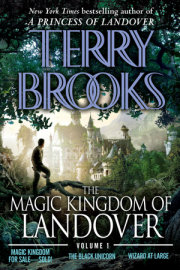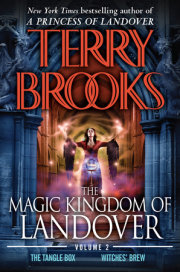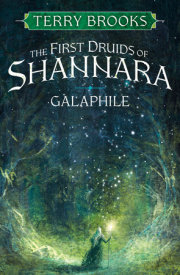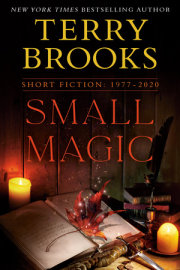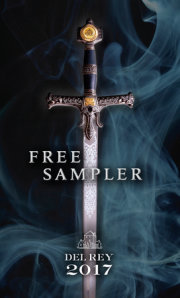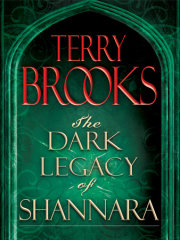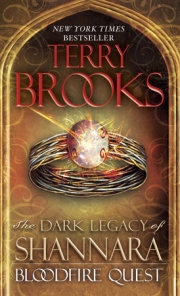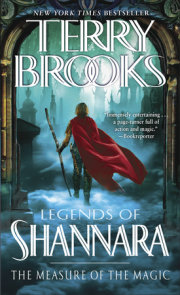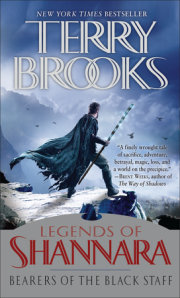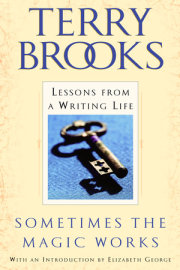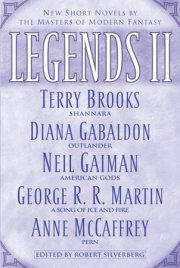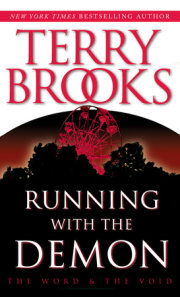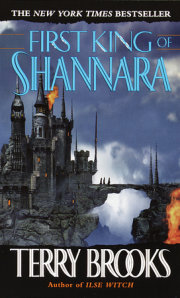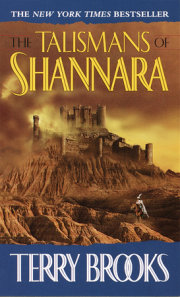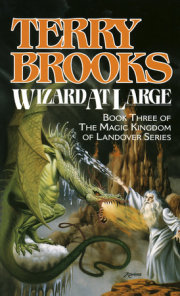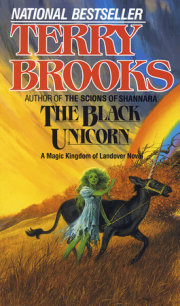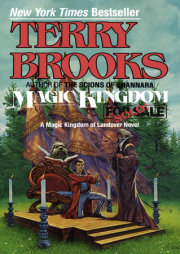Ben
The catalogue was from Rosen’s, Ltd. It was the department store’s annual Christmas Wishbook.
It was addressed to Annie.
Ben Holiday stood frozen before the open cubicle of his mailbox, eyes slipping across the gaily decorated cover of the catalogue to the white address label and the name of his dead wife. The lobby of the Chicago high rise seemed oddly still in the graying dusk of the late afternoon rush hour, empty of everyone but the security guard and himself. Outside, past the line of floor- toceiling windows that fronted the building entry, the autumn wind blew in chill gusts down the canyon of Michigan Avenue and whispered of winter’s coming.
He ran his thumb over the smooth surface of the Wishbook. Annie had loved to shop, even when the shopping had only been through the mail- order catalogues. Rosen’s had been one of her favorite stores.
Sudden tears filled his eyes. He hadn’t gotten over losing her, even after two years. Sometimes it seemed to him that losing her was nothing more than a trick of his imagination—that when he came home she would still be there waiting for him.
He took a deep breath, fighting back against the emotions that were aroused in him simply by seeing her name on that catalogue cover. It was silly to feel like this. Nothing could bring her back to him. Nothing could change what had happened.
His eyes lifted to stare into the dark square of the now- empty mailbox. He remembered what it had been like when he had first learned that she had been killed. He had just returned from court, a pre- trial on the Microlab case with old Wilson Frink and his sons. Ben was in his office, thinking of ways to persuade his opposition, a lawyer named Bates, that his latest offer of settlement would serve everyone’s best interests, when the call had come in. Annie had been in an accident on the Kennedy. She was at St. Jude’s in critical condition. Could he come right over . . . ?
He shook his head. He could still hear the voice of the doctor telling him what had happened. The voice had sounded so calm and rational. He had known at once that Annie was dying. He had known instantly. By the time he had gotten to the hospital, she was dead. The baby was dead, too. Annie had been only three months pregnant.
“Mr. Holiday?”
He looked about sharply, startled by the voice. George, the security guard, was looking over at him from behind the lobby desk.
“Everything all right, sir?”
He nodded and forced a quick smile. “Yes—just thinking about something.” He closed the mailbox door, shoved everything he had taken from it save the catalogue into one coat pocket and, still gripping the Wishbook in both hands, moved to the ground- floor elevators. He didn’t care for being caught off balance like that. Maybe it was the lawyer in him.
“Cold day out there,” George offered, glancing out into the gray. “Going to be a tough winter. Lot of snow, they say. Like it was a couple of years ago.” “Looks that way.” Ben barely heard him as he glanced down again at the catalogue. Annie always enjoyed the Christmas Wishbook. She used to read him promos from some of its more bizarre items. She used to make up stories about the kind of people who might purchase such things.
He pushed the elevator call button and the doors opened immediately. “Have a nice evening, sir,” George called after him.
He rode the elevator to his penthouse suite, shucked off his topcoat, and walked into the front room, still clutching the catalogue. Shadows draped the furnishings and dappled the carpeting and walls, but he left the lights off and stood motionless before the bank of windows that looked out over the sunroof and the buildings of the city beyond. Lights glimmered through the evening gray, distant and solitary, each a source of life separate and apart from the thousands of others.
We are so much of the time alone, he thought. Wasn’t it strange?
He looked down again at the catalogue. Why do you suppose they had sent it to Annie? Why were companies always sending mailers and flyers and free samples and God- knew- what- all to people long after they were dead and buried? It was an intrusion on their privacy. It was an affront. Didn’t these companies update their mailing lists? Or was it simply that they refused ever to give up on a customer?
He checked his anger and, instead, smiled, bitter, ironic. Maybe he should phone it all in to Andy Rooney. Let him write about it.
He turned on the lights then and walked over to the wall bar to make himself a scotch, Glenlivet on the rocks with a splash of water; he measured it out and sipped at it experimentally. There was a bar meeting in a little less than two hours, and he had promised Miles that he would make this one. Miles Bennett was not only his partner, but he was probably his only real friend since Annie’s death. All of the others had drifted away somehow, lost in the shufflings and rearrangings of life’s social order. Couples and singles made a poor mix, and most of their friends had been couples. He hadn’t done much to foster continuing friendships in any case, spending most of his time involved with his work and with his private, inviolate grief. He was not such good company anymore, and only Miles had had the patience and the perseverance to stay with him.
He drank some more of the scotch and wandered back again to the open windows. The lights of the city winked back at him. Being alone wasn’t so bad, he reasoned. That was just the way of things. He frowned. Well, that was his way, in any case. It was his choice to be alone. He could have found companionship again from any one of a number of sources; he could have reintegrated himself into almost any of the city’s myriad social circles. He had the necessary attributes. He was young still and successful; he was even wealthy, if money counted for anything—and in this world it almost always did. No, he didn’t have to be alone.
And yet he did, because the problemwas that he really didn’t belong anyway. He thought about that for a moment—forced himself to think about it. It wasn’t simply his choosing to be alone that kept him that way; it was almost a condition of his existence. The feeling that he was an outsider had always been there. Becoming a lawyer had helped him deal with that feeling, giving him a place in life, giving him a ground upon which he might firmly stand. But the sense of not belonging had persisted, however diminished its intensity—a nagging certainty. Losing Annie had simply given it new life, emphasizing the transiency of any ties that bound him to whom and what he had let himself become. He often wondered if others felt as he did. He supposed they must; he supposed that to some extent everyone felt something of the same displacement. But not as strongly as he, he suspected. Never that strongly.
He knew Miles understood something of it—or at least something of Ben’s sense of it. Miles didn’t feel about it as Ben did, of course. Miles was the quintessential people person, always at home with others, always comfortable with his surroundings. He wanted Ben to be that way; he wanted to bring him out of that self- imposed shell and back into the mainstream of life. He viewed his friend as some sort of challenge in that regard. That was why Miles was so persistent about these damn bar meetings. That was why he kept after Ben to forget about Annie and get on with his life.
He finished the scotch and made himself another. He was drinking a lot lately, he knew—maybe more than was good for him. He glanced down at his watch. Forty- five minutes had gone by. Another forty- five and Miles would be
there, his chaperone for the evening. He shook his head distastefully. Miles didn’t understand nearly as much as he thought he did about some things. Carrying his drink, he walked back across the room to the windows, stared out a moment, and turned away, closing the drapes against the night. He moved back to the couch, debating on whether to check the answerphone, and saw the catalogue again. He must have put it down without realizing it. It was lying with the other mail on the coffee table in front of the sectional sofa, its glossy cover reflecting sharply in the lamplight.
Rosen’s, Ltd.—Christmas Wishbook.
He sat down slowly in front of it and picked it up. A Christmas catalogue of wishes and dreams—he had seen the kind before. An annual release from a department store that ostensibly offered something for everyone, this particular catalogue was for the select few only—the wealthy few.
Annie had always liked it, though.
Slowly, he began to page through it. The offerings jumped out at him, a collection of gifts for the hard- to- please, an assortment of oddities that were essentially one- of- a- kind and could be found nowhere but in the Wishbook. Dinner for two in the private California home of a famous movie star, transportation included. A ten- day cruise for sixty on a yacht, fully crewed and catered to order. A week on a privately owned Caribbean island, including the use of wine cellar and fully stocked larder. A bottle of one- hundred- and- fiftyyear- old wine. Hand- blown glass and diamond creations, designed per request.
A gold toothpick. Sable coats for little girls’ dolls. A collector’s chess set of science fiction film characters carved from ebony. A hand- woven tapestry of the signing of the Declaration of Independence.
The list of offerings went on, item after item, each more exotic and strange than the one before. Ben took a strong pull on his scotch, almost repulsed by the extravagance of it all, but fascinated nevertheless. Then he thumbed ahead into the center of the catalogue. There was a transparent bathtub with live goldfish encased in the framework. There was a silver shaving kit with your initials inlaid in gold. Why in God’s name would anyone . . . ? He caught himself midway through the thought, his eyes drawn instantly to an artist’s rendering of the item being offered on the pages that lay open before him.
The promo of the item read as follows:
MAGIC KINGDOM FOR SALE Landover—island of enchantment and adventure rescued from the mists of time, home of knights and knaves, of dragons and damsels, of wizards and warlocks. Magic mixes with iron, and chivalry is the code of life for the true hero. All of your fantasies become real in this kingdom from another world. Only one thread to this whole cloth is lacking—you, to rule over all as King and High Lord. Escape into your dreams, and be born again.
Price: $1,000,000.
Personal interview and financial disclosure.
Inquire of Meeks, home office.
That was all it read. The artist’s colorful rendering depicted a knight on horseback engaged in battle with a fire- breathing dragon, a beautiful and rather thinly clad damsel shrinking from the conflict before a tower wall, and a dark- robed wizard lifting his hands as if to cast an awesome and life- stealing spell. Some creatures that might have been Elves or Gnomes or some such scampered about in the background, and the towers and parapets of great castles loomed against a gathering of hills and mists.
It had the look of something out of King Arthur and the Knights of the Round Table.
“This is nuts!” he muttered almost without thinking.
He stared at the item in disbelief, certain that he must be mistaken. Then he read it again. He read it a third time. It read the same. He finished his scotch in a single gulp and chewed on the ice, irritated with the nonsensicality of the offering. A million dollars for a fairy- tale kingdom? It was ridiculous. It had to be some kind of joke.
He threw down the catalogue, jumped to his feet, and crossed to the bar to mix himself a fresh drink. He stared momentarily at his reflection in the mirrored cabinet—a man of medium height, lean, trim, and athletic- looking, his face rather drawn, with high cheekbones and forehead, slightly receding hairline, hawk nose and piercing blue eyes. He was a man of thirty- nine going on fifty, a man on the verge of passing into middle age too young.
Escape into your dreams . . .
He crossed back to the couch, placed the drink on the coffee table and picked up the Wishbook once more. Again he read the item on Landover. He shook his head. No such place could possibly exist. The promo was a tease, a hype—what the car business called puffing. The truth was masked in the rhetoric. He chewed gingerly at the inside of his lip. Still, there wasn’t all that much rhetoric being used to promote the item. And Rosen’s was a highly respected department store; they were not likely to offer anything that they could not deliver, should a buyer appear.
He grinned. What was he thinking? What buyer? Who in his right mind would even consider . . . ? But of course he was questioning himself now. He was the one considering. He had been standing there, drinking his drink and thinking about how he didn’t belong; and when he had picked up the Wishbook,
the item on Landover had caught his attention right away. He was the one who felt himself the outsider in his own world, who had always felt himself the outsider, who was seeking always a way to escape what he was.
And now here was his chance.
His grin broadened. This was crazy! He was actually contemplating doing something that no sane man would even think twice about!
The scotch was working its way to his head now, and he got up again to walk it off. He looked at his watch, thinking of Miles, and suddenly he didn’t want to go to that bar meeting. He didn’t want to go anywhere.
He walked to the phone and dialed his friend.
“Bennett,” the familiar voice answered.
“Miles, I’ve decided not to go tonight. Hope you don’t mind.”
There was a pause. “Doc, is that you?”
“Yeah, it’s me.” Miles loved to call him Doc, ever since the early days when they went up against Wells- Fargo on that corporate buy- out. Doc Holiday, courtroom gunfighter. It drove Ben nuts. “Look, you go on without me.”
“You’re going.” Miles was unflappable. “You said you were going and you’re going. You promised.”
“So I take it back. Lawyers do it all the time—you read the papers.”
“Ben, you need to get out. You need to see something of the world besides your office and your apartment—however lavish the two may be. You need to let your colleagues in the profession know that you’re still alive!”
“You tell them I’m alive. Tell them I’ll make the next meeting for sure. Tell them anything. But forget about me for tonight.”
There was another pause, this one longer. “Are you all right?”
“Fine. But I’m in the midst of something. I want to stay with it.”
“You work too hard, Ben.”
“Don’t we all? See you tomorrow.”
He placed the receiver back on the cradle before Miles could say anything further. He stood staring down at the phone. At least he hadn’t lied. He was in the midst of something, and he did want to stay with it—however crazy it might be. He took a drink of the scotch. If Annie were there, she would understand. She had always understood his fascination with puzzles and with challenges that others might simply step around. She had shared so much of that with him. He shook his head. Of course, if Annie were there, none of this would be happening. He wouldn’t be thinking about escaping into a dream that couldn’t possibly be.
He paused, struck by the implications of that thought. Then holding his drink in his hand, he crossed back to the sofa, picked up the catalogue, and began reading once more.
Ben was late getting to the offices of Holiday and Bennett, Ltd. the next morning, and by the time he arrived his disposition was less than agreeable. He had scheduled an early appearance on a merger contest and gone straight to the Courts Building from home, only to discover that somehow his setting had been removed from the docket. The clerks had no idea how this had happened, opposing counsel was nowhere to be found, and the judge presiding simply advised him that a resetting would be the best solution to the dilemma. Since time was of the essence in the case in question, he requested an early setting—only to be told that the earliest setting possible was in thirty days. Things were always busiest with the approach of the holiday season, the motions clerk announced unsympathetically. Unimpressed with an explanation that he had heard at least twenty times already that November, he requested a setting for a preliminary injunction—only to be told that the judge hearing stays and pleas for temporary relief was vacationing for the next thirty days at some ski resort in Colorado, and it hadn’t been decided yet who would bear his docket load while he was gone. A decision on that would probably be made by the end of the week and he should check back then.
The looks directed at him by clerks and judge alike suggested that this was the way of things in the practice of law and that he, of all people, ought to realize it by now. He ought, in fact, simply to accept it.
He did not choose to accept it, however, did not care in the least to accept it, and was, by God, sick and tired of the whole business. On the other hand, there was not very much he could do about it. So, frustrated and angered, he went on to work, greeted the girls in the reception area with a mumbled good morning, picked up his phone messages, and retired to the confines of his office to fume. He had enjoyed less than five minutes of that when Miles appeared through the doorway.
“Well, well, just a little ray of sunshine this morning, aren’t we?” his friend needled cheerfully.
“Yeah, that’s me,” he agreed rocking back in his desk chair. “Joy to the world.”
“Hearing didn’t go so well, I gather?”
“Hearing didn’t go at all. Some incompetent took it off the call. Now I’m told it can’t be put back on until hell freezes over and cows fly.” He shook his head. “What a life.”
“Hey, it’s a living. Besides, that’s the way it all works—hurry up and wait, time is all we’ve got.”
“Well, I’m fed up to the teeth with it!”
Miles moved over to occupy one of the client chairs that fronted the long oak desk. He was a big man, heavy through the middle, thick dark hair and
mustache lending maturity to an almost cherubic face.
His eyes, perpetually lidded at half- mast, blinked slowly. “Know what your problem is, Ben?”
“I ought to. You’ve told me often enough.”
“Then why don’t you listen? Quit spending all of your time trying to change the things you can’t!”
“Miles . . .”
“Annie’s death and the way the legal system works—you can’t change those kinds of things, Ben. Not now, not ever. You’re like Don Quixote tilting with windmills! You’re ruining your life, do you know that?”
Ben brushed Miles aside with a wave of his hand. “I do not know that, as a matter of fact. Besides, your equation doesn’t balance. I know that nothing will bring Annie back—I’ve accepted that. But maybe it’s not too late for the legal system—the system of justice that we used to know, the one we both went into the practice of law to uphold.”
“You ought to listen to yourself sometime,” Miles sighed. “There’s nothing wrong with my equation, chief. My equation is painfully accurate. You have never accepted Annie’s death. You live your life in a goddamned shell, because you won’t accept what’s happened—as if living like that is somehow going to change things! I’m your friend, Ben—maybe the only one you’ve got left. That’s why I can talk to you like this—because you can’t afford to lose me!” The big man leaned forward. “And all of this crap about the way things used to be in the practice of law sounds like my father telling me how he used to walk five miles through the snow to get to school. What am I supposed to do—sell my car and walk to work from Barrington? You can’t turn back the clock, no matter how much you might like to. You have to accept things as you find them.”
Ben let Miles finish without interruption. Miles was right about one thing—only he could talk to him like this, and it was because he was his best friend. But Miles had always approached life differently than he, always preferring to blend in with his surroundings rather than to shape them, always preferring to make do. He just didn’t understand that there were some things in life a man simply should not accept.
“Forget about Annie for the moment.” Ben paused meaningfully before continuing. “Let me suggest that change is a fact of life, that it is a process brought about by the efforts of men and women dissatisfied with the status quo, and that it is essentially a good thing. Let me also suggest that change is frequently the result of what we have learned, not simply what we have envisioned. History plays a part in change. Therefore, what once was and was good ought not to be cast aside as being simply wishful reminiscence.” Miles brought up one hand. “Look, I’m not saying . . .”
“Can you honestly sit there, Miles, and tell me that you are satisfied with the direction that the practice of law in this country is taking? Can you even tell me that it is as good and true as it was fifteen years ago when we entered the profession? Look at what’s happened, for Christ’s sake! We are bogged down in a morass of legislation and regulation that reaches from here to China, and even the judges and lawyers don’t understand half of it. We used to be able to call ourselves general practitioners—now we are lucky to be competent in one or two fields, simply because of the updating we must constantly do in order to keep ourselves current. The courts are slow and overburdened. The judges are all too often mediocre lawyers put on the bench through politics. The lawyers coming out of law school view their occupation as a way to make big bucks and get their names in the paper—forget the part about helping people. The whole profession has the worst press this side of Nazi Germany. We have advertising—advertising! Like used- car salesmen, or furniture- store dealers! We don’t adequately educate ourselves. We don’t adequately police ourselves. We just go through the motions and try to get by!”
Miles stared at him, his head cocked appraisingly. “Are you about finished?” He nodded, slightly flushed. “Yeah, I suppose so. Did I leave anything out?” Miles shook his head. “I think you covered the whole nine yards. Feel any better?”
“Much, thanks.”
“Good. One final comment, then. I heard everything you said, I duly recorded every word, and I happen to agree with most of it. And I say to you nevertheless, so what? There have been thousands of speeches given, thousands of committee meetings held, thousands of articles written addressing the very problems you so eloquently outline in your tirade—and how much difference has any of it made?”
Ben sighed. “Not much.”
“That is understating it. Since this is so, what difference do you think you are going to make?”
“I don’t know. But that’s not the point.”
“No, I don’t suppose it is for you. So, what the hell? If you want to enter into a one- man war with the system in an effort to change it, fine and dandy. But a little moderation in your commitment wouldn’t hurt. A day off now and then for some of life’s less pressing matters might give you some perspective and keep you from burning out completely. Okay?”
Ben nodded. “Okay. Yeah, okay. But I’m not good at moderation.”
Miles grinned. “Tell me about it. Now let’s talk about something else. Let’s talk about last night. Believe it or not, a few people asked about you at the bar meeting—said they missed seeing you.”
“They must be desperate for companionship, then.” Miles shrugged. “Maybe. What was so important that you had to cancel
out? New case?”
Ben thought about it a moment, then shook his head. “No, nothing new. Just something I wanted to follow up on.” He hesitated. Then impulsively he reached down into his briefcase and pulled out the Wishbook. “Miles, want to see something really odd? Take a look at this.”
He thumbed the catalogue open to the item about Landover and passed it across the desk. His friend shifted forward to take it from him and then settled back again in the chair.
“Magic kingdom for sale . . . Landover—island of enchantment and adventure . . . Hey, what is this?” Miles fumbled to find the cover.
“It’s a Christmas catalogue,” Ben explained to the big man quickly. “From Rosen’s, Ltd. out of New York. A Wishbook. You’ve seen the type—full of one of a kind gifts.”
Miles started reading again, finished, and looked up. “Only a million dollars, huh? What a bargain! Let’s fly right to New York and apply—beat the rush.”
“What do you make of it?”
Miles stared at him. “Same as you, I hope. Someone is nuts!”
He nodded slowly. “That’s what I thought, too. But Rosen’s wouldn’t put an advertisement in a catalogue like this if they couldn’t produce.”
“Then it must be staged. The dragons must be overgrown lizards or something. The magic must be sleight of hand.” Miles laughed. “Knights and damsels courtesy of Central Casting, dragons courtesy of the San Diego Zoo! Johnny Carson will have the whole menagerie on sometime next week!”
Ben waited for the big man’s laughter to die away. “Think so?”
“Of course, I think so! Don’t you?”
“I’m not sure.”
Miles frowned, then read the advertisement one time more. When he was done, he passed the catalogue back across the desk. “Is this what kept you home last night?”
“In part, yes.”
There was a long silence. Miles cleared his throat. “Ben, don’t tell me that you’re thinking of . . .”
The phone rang. Ben picked it up, listened for a moment and looked across the desk at his friend. “Mrs. Lang is here.”
Miles glanced at his watch and rose. “Needs a new will drafted, I think.” He hesitated, looked for a moment as if he might say something more, then jammed his hands in his pants pockets and turned for the door. “Well, enough of this. I’ve got to get some work done. Catch you later.”
He left the room frowning. Ben let him go.
Ben left work early that afternoon and went to the health club to work out. He spent an hour in the weight room, then spent another hour on the light and heavy fighter’s bags he had persuaded them to install several years back. He had been a boxer in his teens—fought out of Northside for the better part of five years. He had been a silver glover and could have been a gold, but other interests had taken him away and then he had gone east to school. But he still kept his hand in—even sparring a couple of rounds now and then back at Northside when he found the time. For the most part, he simply worked out, staying fit, keeping himself sharp. He had done so religiously since Annie died. It had helped him to release some of the frustration and anger. It had helped him to fill the time.
It was true that he had not been able to accept her death, he thought as his cab worked its way through the rush hour traffic from the health club to the high rise. He could admit it to himself if not to Miles. The truth was that he didn’t know how to accept it. He had loved her with an intensity that was frightening, and she him. They never spoke of it; they never had to. But it was always there. When she died, he had thought of killing himself. He had not done so only because he had known deep inside that he should not, that he should never give in to anything so obviously wrong, that Annie would not want him to. So he had gone on with his life in the best way that he could, but he had never found a way to accept that she was really gone. Perhaps he never would.
Frankly, he wasn’t sure that it mattered all that much whether he did. He paid the cabdriver at the curb, walked into the lobby of the high rise, greeted George, and boarded the elevator for his penthouse suite. Miles saw him as a grief- stricken recluse, hiding from the world while he mourned his dead wife. Maybe that was the way everyone saw him. But Annie’s death had not created the condition; it had merely emphasized it. He had been slipping back into himself more and more in recent years, dissatisfied with what he viewed as the continuing deterioration of his profession, frustrated with the way in which it seemed to sink down upon itself until it no longer served the purposes for which it had been created. Miles would think it odd that he should feel that way—Doc Holiday, the corporate trial lawyer who had slain more Goliaths than any David had ever dreamed of facing. What did he have to feel frustrated about when the system had worked so effectively for him? But of course one’s personal successes sometimes only served to point up the inequities worked on others. It was that way with him.
He mixed a Glenlivet and water in his apartment and retired to the front room, seating himself on the sofa and staring out the window into the lights of the city. After a time, he pulled the Christmas Wishbook from Rosen’s from his briefcase and opened it to the item on Landover. He had been thinking about it all day; he had been thinking of nothing else since he had first laid eyes on it last night.
What if it were real?
He sat there for a long time, the glass in his hand, the catalogue open before him, thinking about the possibility.
His present life, he felt, was at a standstill. Annie was dead. The profession of law—for him, at least—was just as dead. There were more cases to be taken, more courtroom battles to be won, more Goliaths for David to slay. But the excesses and deficiencies of the legal system would still be there. In the end, he would simply be going through the same ritual with its frustrations and disappointments, and it would all be meaningless. There had to be more for him in this life.
There had to be.
He looked at the colorful rendering of the knight in battle with the dragon, the damsel in the castle keep, the wizard casting his spell, the fairy folk looking on. Landover. A dream out of a Wishbook.
Escape into your dreams . . .
For one million dollars, of course. But he had the money. He had money enough to buy it three times over. His father and mother had both been wealthy and he had enjoyed a lucrative practice. The million dollars was there—if that was the way he chose to spend it.
And there was the interview with this fellow Meeks. That puzzled him.
What was the purpose of the interview—to screen applicants? Did they anticipate there would be that many and was there some reason to choose among them? Perhaps, where a King was to be selected, there was. He took a deep breath. What sort of King would he make? He had the price of the kingship—but so would others have it. He was physically and mentally fit—but others would be, too. He was experienced in dealing with people and with laws—others might not be. He was compassionate. He was honorable. He was farsighted.
He was crazy.
He finished off the drink, closed the Wishbook, and went into the kitchen to make dinner. He took his time about it, preparing a rather extravagant beef and vegetable dish, and served it to himself with wine. When the meal was finished, he moved back to the front room again and reseated himself on the sofa before the Wishbook.
He already knew what he was going to do. Perhaps he had known all along. He needed something to believe in again. He needed to recapture the magic that had first drawn him to the practice of law—the sense of wonder and excitement it had brought to his life. Most of all, he needed a challenge— because that was what gave life meaning.
Landover
could offer him that.
He was not yet certain that it would, of course. Perhaps it was all an elaborate charade of the sort envisioned by Miles, where the dragons were large iguanas and the knights and wizards were all supplied by Central Casting. Perhaps the dream was a sham, an imitation of what the imagination would have it truly be. Even if it were all real—if it were all as described, all as the artist had rendered it to be—still it might be less than the dream. It might be as ordinary in truth as his present life.
Yet the gamble was worth it, because he had seen the parameters of his present life and there were no unknowns left in it. And somehow, in some unexplainable way, he knew that whatever choices he might make now, with Annie gone the only wrong choice he might make was to make no choice at all.
He crossed back to the bar and made himself an Irish Mist. He toasted himself solemnly in the mirror and drank.
He felt exhilarated.
Copyright © 2009 by Terry Brooks. All rights reserved. No part of this excerpt may be reproduced or reprinted without permission in writing from the publisher.


